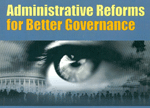India: “After independence, we got bureaucracy not democracy”
Published on Mon, 2013-04-22 14:23
Bangalore - After independence, we got bureaucracy not democracy, said Bhaskar Rao Gorantla, Research Director of National Social Watch (India). He was addressing a gathering of civil society representatives at a consultation programme organized by the Karnataka Social Watch on administrative reforms. Listing various structural problems in the administration, he said that although the central and state level administrations have undergone a positive change since independence, the district/local level administrative bodies have not undergone any significant changes. “Wide powers of control over Panchayat Raj Institutions (PRIs) have been vested with the state bureaucracy; this takes away the essential characteristic of PRIs,” he said. Presenting the gist of the ‘Administrative Reforms for Good Governance’, a book by NC Saxena - former director of Lal Bahadur Shastri National Academy of Administration, Rao said that it is very essential to replace the entire system, as we change the entire structure when 70 percent pipes have leakage issues. Referring to the number of ministries and departments that has increased from 20 to 110 after independence, Rao said that the lack of co-ordination among these ministries and departments have marred development. Moreover, lack of professionalism, corruption and rampant misuse of discretionary powers by the bureaucracy has been deteriorating the administration and the governance, he said. Another speaker Vasudev Sharma, a noted civic activist and executive director of Child Rights Trust, said that the Budget presented by the political parties after coming to power do not reflect their own election manifestoes. On the other hand, the general mass is losing seriousness over political discussions, he said. He also called upon the addressees to contemplate over the crucial issues like lessening days of assembly sessions, rise in pending bills and court cases, and poor implementation of huge budgets. The book points out that it is not due to lack of resource, but due to the poor governance and administration, the country is still plagued by the poverty, starvation, malnutrition, diseases, unhygienic and wretched living conditions, etc. The Government of India transfers close to 6.5 lakh crore every year to the States. If even half of it was to be sent to the seven crore poor families directly by money order, they would receive more than 130 a day! It is due to the inability of the administration to deliver the quality services and good governance, the politicians are forced to adopt the shortcut to remain in the power and become powerful. It is due to the inability of the administration to deliver the quality services and good governance, the politicians are forced to adopt the shortcut to remain in the power and become powerful. Many problems of bureaucracy in India are quite old and well known. Obsession with rules rather than concern for output, promotions based on seniority rather than merit, delays and mediocrity at all levels are some of the factors inhibiting outcomes in government. Many citizens find bureaucracy in India too slow, extremely rigid and mechanical and consequently not flexible and adaptive to cope with change. Due to the control that the IAS and the IPS lobbies exert on the system, a large number of redundant posts in the super-time and superior scales have been created to ensure them quick promotions. Often a senior post has been split, thus diluting and diminishing the scale of responsibilities attached with the post. For instance, in some States against the post of one chief secretary, there are many officers now in equivalent but far less important posts drawing the same salary. In one State, previously where one officer used to be the Secretary of Medical and Health, now there are five officers doing the job of one, four are in-charge of health, family planning, medical and medical education respectively, whereas the fifth one, as principal secretary, oversees the work of these four secretaries! In the long term, steps need to be taken to drastically reduce the number of meaningless posts in the IAS, so that only such posts where people can contribute meaningfully are retained. Increase the period an officer can be out of the system from five to seven years, without losing his seniority; and many posts in the government should be earmarked to permit lateral entry of people from NGO/professional institutions at various levels to bring in a fresh outlook. Retire 25 to 50 percent of the officers at the age of 52 to 55, as it is done in the Army. All organs of state are affected by the malaise of governance. The political executive, legislators, bureaucracy and judiciary – no class of functionaries can escape responsibility. For instance, 20–25 million cases are pending in courts, and justice is inaccessible, painfully slow and costly. Police reforms will remain ineffective if criminal cases are not disposed off expeditiously. Download the publication here. Source: By Newzfirst Correspondent, 4/20/13 |


